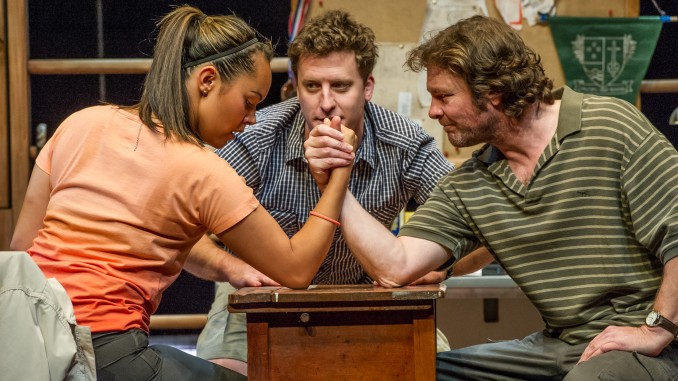
Theatre in Education [by James Wenley]
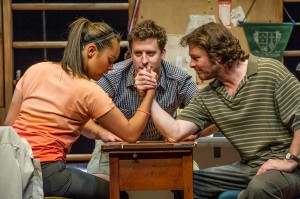
New Zealand’s Education sector contains potentially ripe pickings for a dramatist. It is a perennial battleground of ideologies, agendas, values, and teaching methods and assessments. In recent times the sector itself has resembled a Dave Armstrong style farce: non-standard National Standards, No-go pay and Hekia “Karma” Parata. Armstrong’s newest play Kings of the Gym feels timely, though, in teacher-speak, does not live up to its potential.
Laurie Connor (John Leigh) is the old-school, unfit, head PE Teacher who has been at Hautapa College – a low decile South Auckland school – for twenty years. You’ll know this type of teacher. He eschews lesson plans and calls his kids nicknames like “Chopstick” and “Harry Potter”. He’s a school institution and the kids love him for his no-nonsense style. He’s joined by Pat (Brett O’Gorman), himself a former student of Laurie’s who continues to be influenced by his mentor. They are the Kings, and their castle is the office that overlooks the gym floor.
The set is designed as a nostalgic throwback to the old wooden school gyms by Rachel Walker; large knotted climbing ropes fall off the walls, there’s a bag of well-loved and used basketballs by Laurie’s messy desk, and you can positively smell the odour of sweaty socks and bodies. Many of Laurie’s lessons are conducted by shouting instructions out the window to his class on the gym floor below. Laurie and Pat’s sacred domain of blokey banter and sly beers during school hours is disrupted when prim lefty principal Viv Cleaver (Bronwyn Bradley) – who Laurie likes to call “Cleavage” – announces the PE department will be joined by aspiring teacher and Silver Fern Annie Tupua (Cian Elyse White) whose College of Education by-the-book training puts her at odds with Laurie.
Armstrong initially mines in Gym the familiar territory of the education PC vs anti-PC brigades that he did so well in TV Series Seven Periods with Mr Gormsby, but whereas the anti-PC Gormsby went out of his way to shock, Laurie – who recognises he is a “dinosaur” – just wants to stay in his Gym, and teach just like he has always done, without having to bother about the “new curriculum”. There are some easy gags via Viv about the eager liberal incorporation of Maoritanga in Education. Director Peter Elliot (Gym is his first ATC mainbill) convincingly sets up the character tension between competing education schools-of-thoughts, but in Armstrong’s scheme it feels like we have been here many times before in the 2000s fixation with the pushback against Clark-era Political correctness and NCEA-mentality.
Against this set-up, Gym’s sleight of hand takes us into a quite different political terrain. During a biology lesson that she also teaches, Annie argues the case for intelligent design, which Laurie thinks should be no-go in a secular education system, and this becomes a major focus of the middle-act of the play. Annie is associated with the “Redemption Church” led by a Bishop Tamaki-like figure. It is through this new battleground that Armstrong illuminates his chosen theme of tolerance, specifically the belief “that deep down many of us want everyone to think like we do”. Armstrong intentionally plays to middle-class prejudices for his humour and subjects of ridicule, including the revelations of Annie’s belief system, and in the second-half peels the back the layers to reveal less caricatured and more vulnerable, flawed, and understandable and likeable characters – a device which works to challenge the audience’s own levels of tolerance. To wrap-up the play, Armstrong returns to the initial set-up of Laurie vs the PC establishment.
John Leigh is very good casting indeed, and he and Bradley master the timing needed to deliver Armstrong’s trademark barbs and killer lines and give us some good belly laughs. Bradley keeps surprising as the scheming liberal principle, and manages at times to be the show most offensive character. O’Gorman is less showy but maintains a solid, sympathetic through-line. Cian puts up the good fight as Annie stands up against Laurie, but doesn’t manage to convince in all the major character shifts that the play demands.
Gym plays very well to its audience: it contains good sport humour from Laurie (in fact some of the play’s best satire is sports related) and the value of teaching that doesn’t try to tick the bureaucratic boxes but actually relates to the kids in class, as espoused by Laurie, is something that most sensible people can agree with in general. Laurie’s unique passion and concern for his kids is suitably inspiring, and while we never meet them, we gain our own vivid impression of them, and what makes them special to their teacher. The issues of and how to teach and what to teach the next generation are ever relevant.
The play works as drama commentary on the type of ‘You can believe whatever you want as long as you believe the same things as me’ bias, but as an overall satire the effect is muted. The anti-PC movement, the science vs creationism debate, and even Bishop Tamaki anxiety all reached peaks in the previous decade and Armstrong offers little new food for thought in these areas (although I acknowledge it remains to be seen whether the specter of Charter Schools in New Zealand will reignite the creationism issue here). The two-pronged attack of Armstrong’s structure – the PC encroachment at beginning and end, and religion in the middle – dulls the satiric edge of both, and neither subject’s complexity receives a fulfilling treatment.
Kings of the Gym is presented by Auckland Theatre Company and plays at The Maidment Theatre until 2nd March. More details see ATC.
SEE ALSO: Theatreview.org.nz review by Adey Ramsel

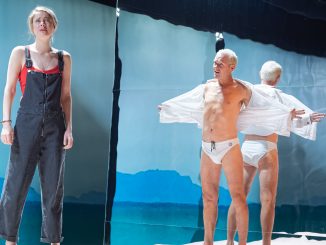
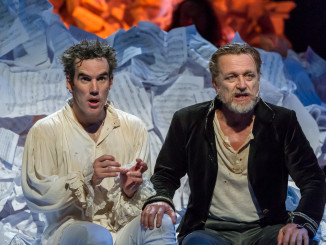
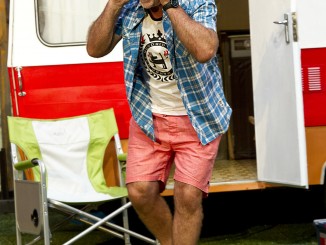
Leave a Reply